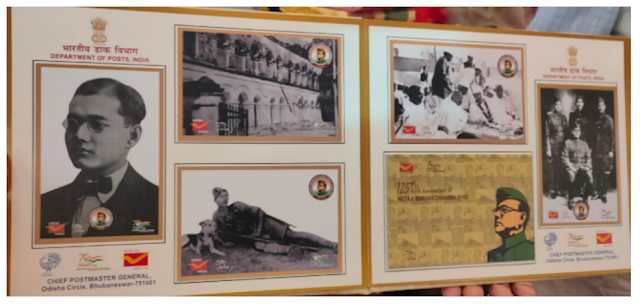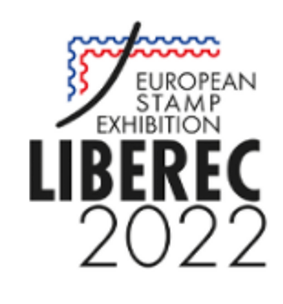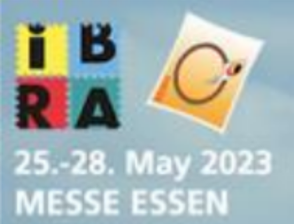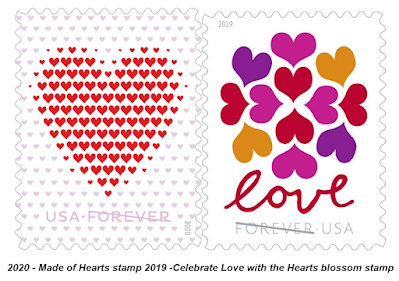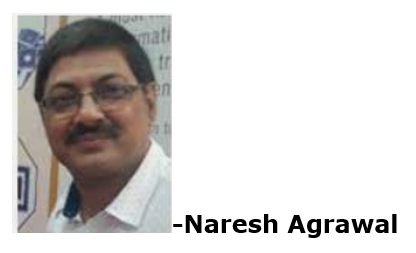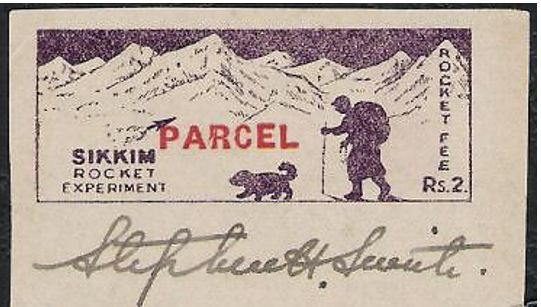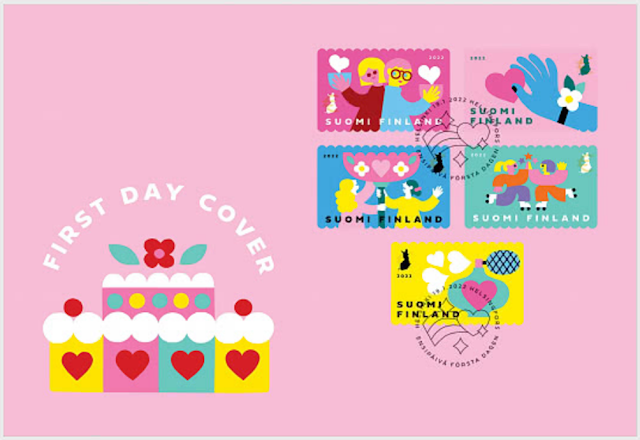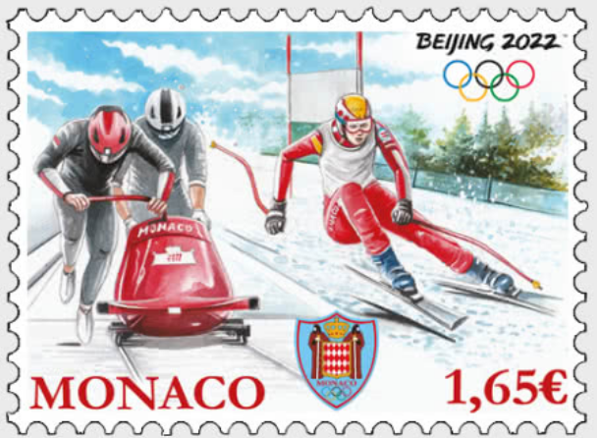Greetings of the Heart !
Happy Valentine's Day !
Date of Issue : 28 January 2022
Dehradun February
2022 Vol. XV Issue No. 170
Readers are requested to send reports of philatelic
activities in their area for publication. Short write ups by the readers about
their journals, societies, publications and philatelic requirements can be sent
for inclusion in this bulletin to the editor: j.jyoti9@gmail.com
Note- This
bulletin is only for circulation among a limited group of philatelists without
any commercial purpose. The bulletin will be sent to the readers only on
request. Those who wish to receive it regularly please reply giving the name of
your city / country with the subject SUBSCRIBE RAINBOW
Love 2022
Dear Reader,
I am pleased to present February 2022 issue of Rainbow Stamp News. While I am writing this, just got a very sad news of passing away of The Melody Queen, Lata Mangeshkar...May her soul Rest in Peace...She will always live with us in her unforgettable melodious songs...Looking forward for a beautiful set of stamps and souvenir sheet by India Post to commemorate the Music legend of all time !
February is the month of ‘Love’. Some Postal administrations issue special
beautiful stamps with 'Love' theme for Valentine Greetings. This special day is also
called Saint Valentine's Day or the Feast of Saint Valentine, is
celebrated annually on February 14. It originated as a Christian feast
day honoring one or two early Christian martyrs named Saint
Valentine and, through later folk traditions, has become a significant
cultural, religious, and commercial celebration
of romance and love in many regions of the world. Now on this day the Lovers express their love and affection
with Greetings and Gifts. In this issue, find some beautiful stamps issued for
this year’s valentine’s day as well as other articles and regular columns !
This is all for this month. More in the next issue. Happy Collecting!
Contents
§ From
the Desk of Naresh Agrawal
§ Recent
Indian Issues
§ In
The News
§ Thematic
Watch
§ Specialized
Section
§ Beginners’
Section
§ Lighter
Side
§ New
Issues from Other Countries
§ Philatelic
Clubs and Society
§ Blogs
& Websites on Philately
§ Current Philatelic Magazines & Newsletters
DIGITAL EXHIBITING: NEED TO FORM
STRINGENT RULES AND CHECKS
No
doubt that philatelic exhibiting has taken a new and well acclaimed shape and
style of Virtual or Digital philatelic exhibiting. So many digital exhibitions
at lower to higher level have been successfully organized throughout the world
during last one year. I have already written and opined from time to time on
this subject in the last few bulletins while pointing out various aspects of
physical and digital exhibiting while looking in to future of philately.
Well,
change is the law of nature. Every change has to be welcomed. So Digital
collection as well as exhibiting is welcomed by everyone. I have seen people
started collecting digitally. Easy to collect, wide range available, no cost or
low cost, easy stocking, no fear of damage, condition modification facility,
easy to prepare exhibits etc. Even whatever
you collect has a backup also. I remember one of my friends commented on this saying
that physical collection is also stored in mind in digital form. And the
pleasure is obtained form that digital or virtual formation in mind. So digital
collection is the best way to do so. Handling and availability of philatelic
stuffs and exhibits is and almost everywhere and is quite easy. In the present scenario when digital postage
payment is being appreciated, we see the future in digital stamp collection and
exhibiting.
So,
after having so much of discussion, this is quite sure that future of philately
lies in digital or virtual exhibiting. We have noted and found many
deficiencies and lacuna in the last digital exhibitions held world over such as
display of scans of images / pictures of stamps or philatelic stuffs instead of
original ones (display of morphed copies) , hardship in assessing the condition
of material displayed by jury, changing
and adjusting sizes of material etc.. This digital exhibiting is basically
displaying your physical exhibits digitally by making the scans of the
philatelic stuffs to be displayed. In the initial articles, I had pointed out
these aspects and suggested some methods to primarily check these malpractices.
The organizers refrained from accepting this fact or showed their inability to
have any control on this. But of late, this has prominently come on the surface
and various eminent philatelists also started commenting on this. In the latest bulletin of SIGNET, the esteemed
quarterly magazine / bulletin of Philatelic Congress of India, Mr Sahdev Sahoo,
Hon. Chief Editor of Signet too has pointed out this and shown his serious
concern. I thank Sri Sahoo especially when philatelist of his stature speaks
something, it has immense effect on the philatelic planners and regulators.
I
have taken up this issue again because, looking in to the future of philately,
there is a great need to design some rules on digital exhibiting. Reducing or
limiting the highest medal to Large Vermeil is genuinely disappointing for the
genuine exhibitors. Which again is detrimental for the development of the
hobby. Deserving exhibitor should be awarded suitably and not in restricted manner
due to undeserving exhibitor. I
personally very strongly recommend that physical check and certification of
the exhibit by appropriate committee or authorized person or commissioner
before it is recommended and put on display panel in the exhibition. Strong
action should be taken against the exhibitors involved in wrong practices. This matter has to be taken up immediately
because delay will hamper the future of philately.
I
hope other philatelists should come up and give their opinion and suggestions
based on their experiences to help philatelic bodies, federations, regulators
to form proper and stringent rules and
regulations.
Finally,
would say that no doubt there is pleasure in digital philately but there is
true pleasure in physically philately. We must not forget that digitally
philately is the outcome of physical philately. I look forward for formation of
new rules and regulations for digital display and exhibiting in the near
future.
-Naresh
Agrawal: email – nareshkumar1992@yahoo.co.in
Recent Indian
Issues
15
January 2022 : Permanent commission to women officers in Indian Army 2 x Rs 10
+ 2 x Rs 15
16
January 2022 : ICMR Deptt. Of Health – Rs5
21
January 2022 : 50 Years of full statehood of Tripura – Rs 5
21January2022 : 50 Years of full statehood of Meghalaya – Rs 5
21 January 2022 : 50 Years of full statehood of Manipur – Rs 5
5 February 2022 : 50th
Anniversary of ICRISAT - Rs 5
New Special Covers
1 January 2022
: 150th Birth Anniversary of
Sri Aurbindo : Sambalpur
21 January 2022
: 150th Birth Anniversary of
Sri Aurbindo : Bangalore
22 January 2022
: 125th Birth Anniversary of Subhash Chandra Bose : New Delhi
23 January 2022
: 125th Birth Anniversary of Subhash Chandra Bose : Cuttack
25 January 2022
: Tribute to Netaji : New Delhi
27 January 2022
: Tribute to Neta Ji “ Jai Hind “ : New Delhi
30 January 2022
: Martyr’s “ Day – Remembering Mahatma Gandhi : Bangalore
New
Picture Post Cards by India Post
To commemorate 125th
Birth Anniversary of Subhash Chandra Bose, India Post released set of six
postcards at Cuttack and New Delhi.
In the
News
RIP ...Melody Queen …..
Lata Mangeshkar : 28 September 1929 - 06 February 2022
A postage stamp on Lata Mangeshkar was issued by S. Tome E Principe (UPU Member) on 31 Jan 2009. A special cover on Lata Mangeshkar and Hemant Kumar was issued during CINEPEX-90, Calcutta. This cover was designed by renowned philatelist and artist Shri Dipok Dey.
These are not postage stamps but designed in a shape of stamps
Lata Mangeshkar, India's beloved
nightingale and the melody queen of Bollywood is no more.. Legendary singer passed
away at the age of 92 years on February 6 after having been hospitalised with
COVID-19. Her contribution to Indian music industry in a career spanning seven
decades gained her honorific titles such as the Nightingale
of India, Voice of the Millennium and Queen of
Melody. She recorded songs in over thirty-six Indian languages and a few
foreign languages, though primarily in Hindi, Bengali, Marathi. She
was the recipient of three National Film Awards, 15 Bengal Film Journalists' Association Awards, four Filmfare Best Female Playback Awards, two Filmfare Special Awards,
the Filmfare Lifetime Achievement Award and many more. In 1974, she
became the first Indian to perform at Royal Albert Hall, London.
Mangeshkar won several awards and honours, including
the Bharat Ratna, India's highest civilian award, Padma Bhushan (1969) Padma Vibhushan (1999), Zee Cine
Award for Lifetime Achievements (1999) Dadasaheb Phalke Award (1989), Maharashtra Bhushan Award (1997) NTR National Award (1999), Bharat Ratna (2001), Legion of Honour (2007), ANR National Award (2009),
three National Film Awards and 15 Bengal Film Journalists' Association
Awards. She also won four Filmfare Best Female Playback Awards. In 1969,
she made the unusual gesture of giving up the Filmfare Best Female Playback
Award in order to promote fresh talent. She was later awarded the Filmfare
Lifetime Achievement Award in 1993 and Filmfare Special Awards in 1994 and
2004.
Unique Love stamp from
Swiss Post
Kiss
In the run-up to Valentine’s Day on 14 February,
Swiss Post issued a “Kiss” stamp on 1 February. In the shape of puckered lips,
it’s not just ideal for love letters, but all kinds of warm and affectionate
messages.
The Feast of St Valentine – a figure believed to represent various
Christian martyrs – was established as a church festival in 469 and has been
associated with romantic love since the 14th century. Lovers in England have
declared their passion on this date since the 18th century. The tradition
spread from there, initially within English-speaking countries and then throughout
the world, partly due to the stationing of US soldiers.
What’s more romantic than a love
letter? The new special stamp was created in the form of a kiss with a heart in
the middle to give lovers a fitting way of franking their message. To achieve
the desired effect, Zurich-based illustrator Isabelle Bühler firstly made the
mouth from paper and then photographed it digitally from the right angle.
2022
Year of the Tiger
The issue of postage stamps consists of two stamps modeled in a mini-sheet of 8 stamps with 8 vignettes, a "first day" cover and for the maximaphily passion, 2 maxicard.
Europa
2022 Theme
This year’s theme of Europa 2022 stamps is “ Stories and Myths”.
Emirates 2022 World Stamp
Exhibition 19-23 January 2022
Indian
Winners
1. Rahul Ganguli 2. SS Rath 3. Anup Kr Raut 4. Capt. Vijay Vadhawa 5. Daniel Montario 6. Dinesh Sharma 7. Lokeswara Rao 8. Piyush Khaitan 9. Col Akhil Kumar 1. 10. Biswanath Mishra 11. Pankaj Tyagi 12. Om Prakash Jagati 13. Rajesh Bhura 14.Mahalingam
Indian Exhibits at Emirates 2022
Traditional
class
Ramachandran
Mahalingam : Kingdom of Cochin – 83 V
Rahul Ganguli
: Early Postmarks of Allahabad - 63 B
Shanti Swarup
Rath : French India Settlementsm – 85 LV
Postal History
Class
Rajesh Bhura : Unpaid and Underpaid Mails of
British India – 80 V
Anup Kumar Raut : Early India Cancellations : All India Series
(1873-1884) -87 LV
Thematic Class
Capt Vijay
Wadhwa : Extreme Birds - 70 S
Biswanath
Mishra : Equidae, the Symbol of Speed - 63 B
Om Prakash
Jagati : From Cloud to Ocean: It’s All
About Me - 78 LS
Daniel Montario : Waterfowl – A Journey Through Its Life - 75 LS
Col Akhil Kumar
: Shaping Civilisation: The Role of the Horse in Human Society – 66 SB
Literature
class
Dinesh Sharma :
Olympic Flame and Torch Relay- 72 S
Lokeswar Rao
Madiraju : Buddhism on Stamps – 81 V
Kiran
Natarajann : The Long Sea Route – A
Remarkable Postal Circuit Between Imperial Russia & British India - 63 B
One Frame
Capt Vijay
Wadhwa : Evolve – A Beak at Evolution - 81
Piyush Khaitan
: O.A.T. and A.V.2 markings on mails connected with India – 85
Picture Post
Cards Class
Pankaj Tyagi : Lucknow Through Picture Postcards - 75 LS
Commissioner
for HELVETIA 2022, Philatelic Exhibition
The
exhibition will include WSC, Traditional, Postal History, Aero-Philately,
Postal Stationery, Thematic, One Frame (TR, PH, PS, AE & TH) and Philatelic
Literature Classes only. Details at : website www.helvetia2022.ch
Email: anilksuri@email.com Mob : +91 9811176908, 8130827029
LONDON 2022
LONDON 2022, FIP Specialised World Stamp
Exhibition to be held in London from 19 to 26 February 2022. Exhibition
Classes: Traditional, Postal History, Aerophilately, Revenues, Postal
Stationery, Thematic, Youth, Open Philately, Philatelic Literature and Championship
Class only.
Mr Anil
Suri has been appointed as new National Commissioner from India, London
2022 . Email : anilksuri@email.com
Mobile- +91 9811176908, 8130827029
Commissioner
for HUNFILEX 2022, FIP Specialised Exhibition
Mr Ajay Kumar Mittal has been appointed National
Commissioner for Hunfilex 2022, FIP Specialised exhibition, to be held at
Budapest, Hungary from 31st March to 3rd April, 2022. The
exhibition will have the following classes :With WSC, Traditional, Postal
History, Revenue, Thematic, Open, One Frame (Trad., P. H. and Thematic only)
and Phil. Lit. only.
Email: ajaymittal1957@gmail.com Mob : + 91 98110 32311
CAPEX 22
Specialised Exhibition CAPEX 2022, to be
held from 09 – 12, June, 2022 at Toronto, Canada. Awards will be treated as
Continental awards. The One Frame exhibition will include : Traditional, Postal
History, Postal Stationery, Aero-philately, Astro-philately, Thematic,
Maximaphily, Revenue, Youth, Modern Phil., Phil. Lit. and Picture Postcards,
Classes only. Mr. Angeet Suri has been appointed National Commissioner.
ANGEET SURI, Email: angeet86@hotmail.com
Phones: +91 9891370070, 8588077077. +91 11
40523366 : Vist : http://www.capex22.org
LIBEREC 2022
European Stamp Exhibition and Polar Salon
“LIBEREC 2022” is organized by Svaz českých filatelistů, z.s. (Union
of Czech Philatelists) in cooperation with club “Evropská výstava poštovních
známek LIBEREC 2022, z.s.”, established for this purpose under FEPA patronage and with FIP recognition.
Venue:
Wellness Hotel Babylon https://www.hotelbabylon.cz/en/
Date: October 13th –
16th,
2022
Exhibition
size: 1200 exhibition frames
European Stamp Exhibition and Polar Salon LIBEREC 2022 : IREX
Visit : https://www.liberec2022.eu/en/aktuality-en/
CAPE TOWN 2021
Philatelic Exhibition
The Cape Town
2021 Exhibition has been postponed. The new dates will be 8th – 12th
November 2022.The date that Entry forms must be received by the National
Commissioners will be no later than 15 May 2022.
• Last date for receipt of Literature exhibits
1 October 2022
Mr. Shakil Ahmed is Indian
National Commissioner for the Cape Town 2021, FIP Specialized World Stamp
Exhibition to be held at Cape Town, South Africa from 8 to 12 November,
2022.Exhibition Classes: Traditional, Postal History, Aerophilately, Postal
Stationery, Revenue, Thematic, Open, Modern Philately, One Frame, Philatelic
Literature and Picture Postcards only)
Shakil Ahmed : Email: ahmedshakil99@gmail.com : (M)
+91-9437225760 / +91-7008025663
TAIPEI 2021
Mr. Rajan
Jayakar has been appointed as Indian National Commissioner for the Taipei 2021
38th FIAP Asian International Stamp Exhibition, Taipei, Chinese
Taipei to be held from 6 to 10 May, 2022
Rajan
Motiram Jayakar : Email:
rajanjayakar1948@gmail.com
Phone: +91-22-22820570, +91-22-22820572, (M) +919821072417
IBRA 2023 and 33st International Stamp Fair will be held at Hall 1
and 2, Messe Essen, Germany from 25 to 28 May, 2023. Mr. Madhukar Jhingan has
been appointed as Indian National Commissioner for the IBRA 2023.
Madhukar
Jhingan : Email: mj@stampsofindia.com (M) +91-9811160965
From this month I am giving a series of articles by noted Thematic Philatelist, Mr Dinesh Chandra Sharma. Mr Dinesh Sharma has won several National and International Awards for his exhibit on ‘Summer Olympics’. His book ‘Olympic Flame and Torch Relay’ also won awards at International philatelic exhibitions. He has been member of jury in many philatelic exhibitions of National and International level. This series of articles will help Thematic Philatelists to prepare their exhibits with recent FIP guidelines and to get a very good score in competitive exhibitions. - Editor
Title and Plan Page in a Thematic Exhibit
Title and Plan page is the most important page of a
thematic exhibit of any class. The title and subtitle define the scope of your
thematic exhibit. Carefully prepared title page leads to the better development
of your exhibits. The title page can be a separate page or the plan can be
included on this page (better to have them on the same page). It takes a lot of time to come out with a
very high-quality title and plan page.
In fact, the title and plan page set the road map for
you to develop your exhibit logical and systematic manner. This page also helps
the judges as well as the visitors in understanding your exhibit in an easy
way. The plan is not merely list of the topics covered by you related to the
theme chosen but it should be well structured and balanced. Every chapter needs
to be given equal weightage and number of pages assigned to each chapter should
be more or less same. No one page chapter must be there in your exhibit as it
is considered to be a big negative point.
Title page of your exhibit should be able to convey
what the exhibit pages in the frames will be expected to show and how. The
purpose of exhibit should clearly be defined on this page. It assists the
judges to follow and understand your exhibits well and it can greatly influence
your overall score. Well defined purpose is an essential part of your title
page and utmost care is needed while drafting it, so that it may convey as
exactly as possible how your exhibit has been developed.
It is always helpful to study the title and plan pages
of different exhibits but do not copy them as it is and prepare your own
depending upon title of your exhibit you have chosen. In early days of my exhibiting the title of
my exhibit was ‘OLYMPIC GAMES’ and I was covering Summer as well as Winter Olympics. Discussing with judges and experienced thematic philatelists and exhibitors, I
changed my title to ‘SUMMER OLYMPIC GAMES’. Therefore, I had to change the plan
to develop my exhibit according to the new title. Since we have to develop our
exhibits to achieve the level of 4th generation of thematic
exhibiting, it has become more challenging to prepare a good title and plan
page for our exhibits.
The judges expect to see your thematic exhibits with
much narrower subject (narrow scope) and more focused approach. For example, an
exhibit on a particular edition of Olympic Games or a particular Olympic Sport
or any other aspect/s of Olympic Games against the exhibit on ‘Olympic Games’.
By following this approach, the exhibitor may achieve a higher award. Of
course, high quality philatelic materials appropriately used are of great
importance to aim for a higher award (Large Vermeil and beyond).
The title and plan page of your exhibit is the page
which the judges see even before they see your exhibit in the frames during the
philatelic exhibition. It may put a high or low impression about your exhibit
prior to the start of the exhibition where your exhibit is participating. Therefore,
take a lot good time to prepare your title and plan page containing the brief explanation
about the exhibit’s significance as well as highlighting the important items in
your exhibit for a satisfactorily
high result.
-Dinesh
Chandra Sharma : email : olymp_sharma@rediffmail.com
Stamps and Themes
Love Stamps
Love Series Stamps The US Postal Service issued its first Love stamp in 1973. Initially called a “Special Stamp for Someone Special,” the stamp was a hit with the public, with more than 300 million sold. Robert Indiana created the iconic Love design in the 1960s and rendered it in both painting and sculpture before adapting it for a postage stamp. The Postal Service issued its second Love stamp in 1982, and new stamps have been added to the series most years since. In the list that follows, numbers in parentheses indicate the postage value of non-denominated stamps when issued. Since 2011, all Love stamps have been Forever stamps, equal in value to the current First Class Mail one-ounce price.
Some popular Love stamps by
USPS
Love (1973)
Color-aid collage on board
This famous design by pop artist Robert Indiana graced the first Love stamp in 1973. The American public embraced it, and more than 300 million stamps were printed. Created in the 1960s, Indiana’s design has become a cultural icon, and visitors to Philadelphia can even enjoy it in sculpture form.
DALLAS, TX — Beginning in 1973, the U.S. Postal Service’s Love postage stamps have featured a wide range of subjects including flowers, Victorian lace, cherubs, swans, and candy hearts. In preparation of Valentine’s Day, it’s a great time to reminisce about five of the most recent stamps that have captured many hearts.
“As you celebrate all of the wonderful events when you show others your love this year, including not only Valentine’s Day, but Mother’s Day, Father’s Day, birthdays, graduations and weddings, remember the many beautiful Forever Stamps the Postal Service has to offer,” Dallas Postmaster Yulonda Love advises.
“The U.S. Postal Service has a long history of issuing stamps to send your love,” Love added. “I want to encourage our customers to express their heartfelt feelings through the mail this year.
“A handwritten card or letter is the absolute best way to send your love – and you have to know I am an expert on this,” Love smiled. “Just look at my last name!”
Specialized Section
A
BRIEF INSIGHT IN TO SIKKIM
EXPERIMENTAL
ROCKET MAIL 1934 to 1944
MAIL
CARRIAGE AND DELIVERY EXPRIMENTS ;
Carriage and
delivery of mail by different means has always been an interesting part of
postal history of the world. Surface, water and air and also through cable /
electronic means have been the basic mediums which further had several other
ways to carry the mail /message/missive. Exciting and innovative experiments to
carry mail has always been a matter of interest for enthusiasts and the then
administrations too helped in that cause. There is rich history of mail by air
such as carriage by homing pigeons, followed by balloons and then so many other
experimental means but experiments on carrying mail through rockets or missiles
gives an interesting study.
BRIEF HISTORY OF ROCKET MAIL
Chinese were the first to use gunpowder for propulsion of ballistic fire works which was later used in Europe in 13th century. Rocketry developed immensely from then to today to carry satellites and human being to other planets. Though its technology was used for propulsion of automobiles, sleds, ships, guided missiles and trains during this period.
It is believed that the idea and official start of carrying mail through Rockets were put to experimental shape long back in 1870 in France during the Siege of Paris by Prussians. But there is no evidence of its practical usage.
But later, rockets were apparently used as early as 1902 to deliver mail from ship to shore in the Fiji Islands. But there is no evidence as no known cover available. By early 1930s rocket mail experiments were being conducted in America, Europe and Australia In February 1931,in Australia Friedrich Schmiedl successfully launched a rocket containing 102 covers and cards to give a beginning to the rocket mail usage. In the same year in September, he initiated the world’s first official rocket mail service. Many countries soon followed it. However, a number of spectacular failures doomed rocket mailed service as a non-viable entity. Today rocket mail is primarily used for commemorative purposes.
In the 1930’s the rocket mail was usually transported in container either in the nose or attached to the side of the rocket. A safe landing could be achieved by the deployment of a parachute from the rocket’s nose as it descended.
However, the most successful early rocket mail pioneer was Stephen Smith in India who initiated some 80 rocket mail flights between 1934 and 1944.
SIKKIM EXPERIMENTAL ROCKET MAIL
The credit of the Asia’s
first successful Rocket mail experiments goes to an enthusiast aero
philatelist, a pioneer rocket engineer who developed techniques in delivering
mail by rocket named Stephen
Hector Smith who was founder of the Calcutta Philatelic Club in 1920 and the
Aero Philatelic Club of India (which changed its name to the Indian Airmail
Society on 19th January 1930). And also to the Ruler of the Sikkim
State Late Sir Tashi Namgyal, the Chogyal for showing keen interest in
permitting and making the experiments successful by taking personal interest
even in firing the mail rockets..
After being partially successful in
his first mail rocket ship to shore launch on 30 September 1934 at Saugar,
Stephen Smith chose Sikkim for conducting such rocket mail experiments because
of its geographical features and mountains which could help experimenting
rocket movement and mail carriage and delivery on difficult terrains crossing
rivers, mountains etc..
According to the letters of the file of Stephen Smith lying
in Archives Department at Gangtok, two
separate events were held at Sikkim. Firstly, Sikkim Rocket mail envelopes was
posted in the first half of 1935 while Sikkim Rocketgram experiment was held in
the second half of the same year. Almost
all of his rocket launches contained signed souvenir covers and specially
designed rocket mail stamps, labels and vignettes.
The rocket mail experiments were carried out in
1935 at five places in Sikkim such as Gangtok, Sarumsa, Ray, Singtam and
Rangpo. Here 20 successful rocket experiments were carried out and the first
rocket parcel mail was achieved. The Oriental Fireworks Company supplied
Smith with 16 rockets between 23 March 1935 and 29 June 1935. Between them,
these “Silver Jubilee” flights carried over a thousand covers.
He
experimented with rockets launches from ship to shore, shore to ship, at night
time, across rough terrain and across rivers.
PHILATELIC COMPONENTS OF SIKKIM ROCKET MAIL
EXPERIMENTS :
These experiments not only set platform for
exploring methods for mail carriage through rockets in future but provided a
huge material and field for philatelic study and research. During the
experiments, various cachets had been provided, various stamps, labels,
vignettes and Rocket grams had been designed, printed and affixed suiting the
nature, date and place of the event. Various manuscripts and marks had been
provided. Some of the covers affixed with these Rocket grams, labels, stamps
were also affixed with postage stamps to ensure proper postage.
ROCKETGRAMS
:
To make the event memorable, some specific Rocket stamps /
Rocketgram designed by Smith in four
different colors overprinted with “ Rocket Mail experiment by Sanction Sikkim
Darbar” were printed in 2000 numbers each. The
rocketgrams bear the portrait of King, Queen, postal runner,
ships, alloon, helicopter, railway train and
mail van. The colors being Yellow,Green,red and Blue. The
rocketgrams were used on covers on different dates such as Blue and Yellow
on 1935 April 7,13, Green on April 8, 9, 10 (parcel), Red on April 10 (Surumsa to Ray) and the Blue on : April 10 (Ray to Surumsa). The
rocket launches received international press coverage. The covers mailed are
unique.
Ray, Sikkim – India 10.4.1935. Perforated rocket mail vignette with blue print on white paper and black overprint.
All the rocketgrams/covers were affixed with specifically designed rocket fee labels bearing the portrait of Postal runner, snow dog. The labels were printed in different colors such as Blue, red Violet. Some of the labels also showed parcel and were first used on April 10,1935 during flight which carried some items other than living beings and the rocketgrams.
THE MAIL ROCKETS USED AND THEIR OPERATION :
Most of the rockets used for mail transport were apparently fairly crude, resembling larger versions of fireworks. Those were approximately 6 feet in length with the body (which carried the mail) 2 feet long. Those were launched by lighting a touch paper from a sloping adjustable stand aimed in the general direction of the intended target. Oriental Fireworks Company based in Calcutta provided all the rockets to Smith who was also responsible for their design. One of the rockets (the largest one) weighed about 7kg with a total length of around 2m. The payload was typically about half a kilogram but larger rockets were capable of carrying up to one kilogram.
Later, some changes were also made in rockets to help those carry things other than mail/missives. Some of the rocket had been added with stabilizing fins, cut almond shaped holes for ventilation and built shock absorbing properties in to the rocket design to help carrying live stock. Those rockets did not employ a parachute and confirmed safe landing on sandy surfaces.
The rockets were launched at a variety of angles e.g. 30, 45 even 80 degrees. The details of the wind speed and direction and the distance the rocket covered for every launch were recorded. It is felt that specific measuring instruments were not used to measure altitude, distance or speed so the measurements are likely to have been qualitative rather than quantitative.
Credit: From
the diary of Stephen H Smith Archives Department at Gangtok
As experimenter was not a trained scientist or engineer, he opted testing of types of rocket fuels, fins for attitude control and even designed a rocket to carry a camera to capture aerial images. Initially he was doing not much more than lighting the blue touch-paper of a traditional firework and then standing back. But several practical experiments had been conducted to understand and promulgate the potential of rocket power as a mechanism for mail transport.
He experimented with rockets launches from ship to shore, shore to ship, at night time, across rough terrain and across rivers measuring short distances from half a kilometer to about over one kilometer.
ROCKET MAIL
EXPERIMENTAL FIRING SEQUENCE ......In next issue
-Naresh Agrawal
Email ID : nareshkumar1992@yahoo.co.in Mobile : 9425530514
For
Contributors : Guidelines for the articles
1. The article
should be a maximum of 10 pages (A4 size) including images in MS word only.
Long articles, if accepted, will be published in parts.
2. Do not Format your article. Like no text wrapping, no caption on the images.
Simply insert the images where required.
4. There should be No Hyperlinks in the text. Use only wherever it is quite
necessary.
5. Images should be clear and sharp. Blurred images will be deleted. Kindly
strictly avoid non -philatelic images.
6. The article will be published as per availability of the required space.
7. Regarding the selection and size of the images, the editor’s decision will
be final.
8. New, good and selective articles will be entertained for publication but
strictly subject to acceptance by the editor “. Articles already published
somewhere will not be accepted for publication.
Beginners’ Section
Amazing Facts
A 15-Inch Snowflake Falls
in Montana!
Set of 16 Snowflake stamps issued in 2006
On
January 28, 1887, it was claimed that a snowflake 15 inches across and eight
inches thick fell on Fort Keough, Montana. While this claim hasn’t been
verified, unusually large snowflakes are possible…
According
to Guinness World Records, the largest snowflake was 15 inches wide and eight
inches thick. It was reported by a rancher in Fort Keogh, Montana, on
January 28, 1887. He said he saw multiple snowflakes that were “larger
than milk pans” and measured one at 15 inches across. Many scientists
doubt his story, but they know large snowflakes are possible – their “branches”
interlock as they fall from the sky, growing larger as more flakes attach.
In 1915, Berlin meteorologists recorded snowflakes up to four inches
wide. Other official observations have found flakes as much as six inches
wide. Through careful study, they found that these larger flakes fell
twice as fast as the smaller ones and were shaped like round bowls with
upturned rims.
In 2014, NASA joined the search for large snowflakes, with the launch of its Global Precipitation Measurement (GPM) satellite. The satellite is the first to detect snowfall from space and identifies flake types, sizes, shapes, numbers, and water content. In addition to providing meteorologists with more accurate precipitation readings, this satellite could discover a new record-size snowflake.
We’ve all heard the phrase, “No two snowflakes are alike.” But when millions of flakes drift to the earth in a single snowfall, some ask – is this really possible? The idea that no two snowflakes are alike was made famous by Wilson “Snowflake” Bentley. Photographing over 5,000 snowflakes and snow crystals in his life, he never discovered two that were exactly the same.

2006 Snowflakes booklet of 20
One interesting question raised by modern scientists – if two identical snowflakes fall, who would know, since no one can examine every one. Generally, it is agreed that they are all different, right down to the molecular level. Snow crystals are made of water molecules. Though water is two parts hydrogen and one part oxygen (H2O), some water molecules have one part deuterium (heavy hydrogen) in place of one regular hydrogen atom. These differences allow for untold numbers of snow crystal and snowflake variations. Temperature and humidity are the deciding factors in what type of flake is formed.
Snowflakes are composed of 2 to 200 separate snow crystals that have formed around tiny bits of dirt carried up into the atmosphere. The snow crystals develop into one of four shapes depending on temperature. Six-pointed stars form at 3˚ to 10˚F. Flat, six-sided plates form at 10˚ to 18˚F and again between 27˚ to 32˚F. Six-sided columns form from 18˚ to 23˚, and needles form at 23˚ to 27˚F.
As a snow
crystal grows, it becomes heavier and falls. The air and temperature
around the crystal are constantly changing. Even a small change in these
conditions can lead to different growth patterns. No two crystals have
the same history, so no two are alike. Falling snow crystals stick to one
another to form snowflakes if they pass through warmer air. At very cold
air temperatures, they do not stick together well. Thus, bitter-cold
snowfalls are composed mostly of snow crystals rather than snowflakes.
Snow crystals are typically only 0.02 to 0.2 inches across, while the average
snowflake is about 0.4 inches across. Large flakes usually only grow when
winds are very light.
Irregular crystals, the most common type, appear
clumped together and bear little resemblance to the elegant flakes most of us
picture when we think of a snowflake. Another common type is stellar
plates. While they feature the six arms all snowflakes have, they are
thin and broad, like a dinner plate. Sectored plates are similar, but the
arms are narrow. The most common snowflakes are stellar dendrites.
Dendrite means “tree-like,” so these flakes have branches. The flakes are
usually two to four millimeters wide and can be seen with the naked eye.
Fern-like stellar dendrites have even more side branches and are the largest
snow crystals – usually five millimeters wide or larger. The number of
different kinds of flakes is a matter of debate even today. Scientists’
estimates range anywhere from seven to 80 types of snow crystals.
Fleetwood First Day Cover
Source : Mystic Stamp Co.
Lighter Side
Crossword
Puzzle #1…
Down:
1. Issued to raise funds: compulsory use (3,5)
2. Early British term for air mail (6,4)
5. A coil of stamps (4)
Across:
3. A rubber stamp or
printed impression on an envelope which describes the event for which the
envelope was mailed (6)
4. Any small hole in a
postage stamp other than perforations applied officially, and thus construed as
damage (7)
6. A set of postage
stamps featuring a particular topic issued simultaneously by a number of
countries (7)
7. Any device for
attaching a stamp or other item to an album page (5)
New Issues
from other countries
Austria
27 January 2022 : The First Hybrid Cover
The stamp shows the first hybrid car built between 1900 and 1905,
the "Lohner-Porsche Mixte ", a gasoline and electric vehicle, a
partnership between manufacturer Ferdinand Porsche and Lohner-Werke, an
Austrian subsidiary of Bombardier Transportation.
Finland
19 January 2022 : Valentine’s day
19 January 2022 : Spring awakens
France
15 January
2022 : Jean-Baptiste
Poquelin (Playwright)
Latvia
18 January 2022: Flowers
Romania
24 January 2022 : Regional Cheeses
The sheetlet shows the map of Belgium, divided into regions where certain types of cheeses occur, with stylized drawings of cheeses and a cheese knife. The sheetlet was also given a special shape, in the form of a slice of cheese with holes.
28 January 2022 : Green Friday :
Stop! Today The Car Is Standing Still !
Romfilatelia once again urges responsibility for environmental protection, joining the “Green Friday” campaign, initiated by the Ministry of Environment, Waters and Forests, through the postage stamps issue with the theme: “Give your car a day off!”, which were put into circulation on Friday, January 28th 2022.
The Ministry
of Environment, Waters and Forests (MEWF) initiated and launched the “Green
Friday” campaign on the 12th of March 2021 in order to promote alternative
means of transportation. The campaign, baring the slogan “Give your car a day
off!”, urges employees of the public sector in Romania to use alternative means
of transportation instead of cars on Fridays in order to decrease pollution and
lower carbon emissions and encourage the use of pedestrian traffic for the
benefit of health.
New Zealand
2 February 2022 : Historic Ships of 19th Century
Depicted
in the stamps is an 1843 trading scene in Cloudy Bay near Nelson, an 1852
whaling expedition on American whaling vessel the Charles W. Morgan, settler
ship the Mataura shown navigating rough seas and the Felicity and a fleet of
sailing vessels in what was known then as Blind Bay (now Tasman Bay or Te
Tai-o-Aorere).
Slovenia
28 Jan 2022 : Valentine’s Day
Blogs & Websites
Philatelic
Clubs & Societies
Prayag Philatelic Society - https://prayagphilatelicsociety.org/
Ananthapuri
Philatelic Association, Thiruvanthapuram
Baroda
Philatelic Society - http://www.vadophil.org/
Chandigarh
Philatelic Club
Deccan
Philatelic Society – Pune, Maharashtra
Eastern
India Philatelists’ Association -http://www.filacapsule.blogspot.com/
The
Hyderabad Philatelic and Hobbies Society
India
Study Circle - http://www.indiastudycircle.org/
Indian
Thematic Society, Ludhiana -http://indianthematicstamps.webs.com/
Ludhiana
Philatelic Club
Numismatic & Philatelic Association of Vellore
Fort
http://numismaticphilavellore.site40.net/index.htm
Philatelic
Congress of India - http://www.philateliccongressofindia.com/
Philatelic
Society of Rajasthan, Jaipur
Philatelic
Society of India , Mumbai : http://www.psi1897.com/
Orissa Philatelic Association,
Mail id-: orissaphilatelic@gmail.com
Rainbow
Stamp Club -http://rainbowstampclub.blogspot.com/
Rajkot
Philatelic Society – Rajkot, Gujarat
Gujarat
Philatelic Association - Ahmedabad
South
India Philatelists Association -http://www.sipa.org.in/
The
Army Philatelic Society, Pune
Stamps
of India – http://www.stampsofindia.com
RAINBOW STAMP CLUB
This is a blog of e-Stamp Club www.rainbowstampclub.blogspot.com .
The idea of this blog is to extend the philatelic fraternity in all corners of
the world. Readers may write about themselves with their collecting interests
and share new ideas with other philatelists.
New Posts on recent issues, news on stamp activities, and Contributions
by members are published every day on this blog. Readers may also express their
views on any philatelic matter which will be published under Club News at
Rainbow Stamp Cub Blog. Philatelic Clubs and Societies may also send brief
write ups. Readers may send reports on new issues, special covers,
cancellations & philatelic activities of their area for inclusion in this
Blog. - Editor
Current
Philatelic Magazines – Newsletters
-VADOPHIL, Editor - Prashant
Pandya &TimirShah and published by Baroda Philatelic Society, Vadodara.
Website -http://www.vadophil.org/
-ITS Stamp News - Quarterly - Editor: Suraj Jaitly Publisher: Indian Thematic
Society website - http://itsstampnews.blogspot.com/
-Ananthpuri Stamp Bulletin - Monthly e -stamp bulletin of Anathapuri Philatelic
Association, Thiruvanthapuram
-Journal of the Army Philatelic Society : Editor – Col Jayanta Dutta
-India Post – Quarterly Journal of the India Study Circle publishes original
articles submitted by members of ISC.
-Deccan Philatelist from Deccan Philatelic Society, Pune. edited by Col Jayanta
Dutta
-The Hyderabad Philatelist from Hyderabad Philatelic and Hobbies Society Editor
– Prakash Agrawal
-SIPA Bulletin issued by South India Philatelists’ Association
Acknowledgment
- Ananthapuri Stamp Bulletin February 2021 issue edited by Mohanachandran
Nair
- Judaica Thematic Society (UK) February 2021 Newsletter edited by Gary Goodman email : judaicathematicsociety@talktalk.net
-The Hyderabad Philatelist December 2021 issue
edited by Shri Prakash Agrawal
Crossword Puzzle #1 (Answer)…
Courtesy - News and Image Resource to this issue : EIPA, Prayag Philatelic Society, Orissa Philatelic Association, EIPA, Philately Promoters Whatsapp groups ; Suresh R.- Bangalore, USPS, Ajay Kumar Mittal- New Delhi, Europa Stamps
Address for communication:
Jeevan Jyoti, c/o Mr. Ajay
Srivastav, PCCF , HP Forest Deptt., Talland Shimla-171002, India . E-mail – j.jyoti9@gmail.com
A Request to
Readers & Contributors –
·
Please do not send the text in scan form or PDF. Send
your write ups in MS Word only.
·
Last
date for receiving articles/ News /write ups – 25th of every month.
·
For articles
: Kindly send images in jpg compressed form and text in MS Word
only Please do not
use any formatting and text wrapping in the article. Simply
put the images under text where required.
·
If you like this issue please forward it to your friends and help
in promoting philately.
·
Please do not send forwarded messages for promotional
section if you want to give any information for promotion please write
personally with brief write up. As this newsletter is not used for any
commercial purpose in any manner.
Attention
– Please do
not send text or image for publication in PDF.
Any material from this newsletter may be reproduced only with the
written permission from the editor.
Happy Collecting ……….
Rainbow Stamp News is
edited and published monthly by Jeevan Jyoti from Dehradun (Uttarakhand ) India for free circulation
among philatelists.











